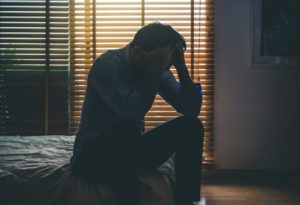Everyone experiences sadness from time to time. The difference between normal expressions of disappointment and sadness and having a depressive disorder is dependent on the length of time the person experiences these feelings and the number of specific diagnostic criteria they meet.
Clinically significant depression, which the American Psychiatric Association (APA) now defines as a major depressive disorder (MDD) is a form of a mental health disorder that is present in a person for at least two weeks. During this period, the person must satisfy at least five specific diagnostic criteria to receive a formal diagnosis of MDD. At least one of these symptoms must consist of depressed mood (sadness or the blues) and/or a significant loss of the ability to experience pleasure or a loss of interest in activities that usually gave the person pleasure.
One factor that will rule out the person being diagnosed with MDD is when it is determined that a substance caused the symptoms. Whenever an individual is suspected of experiencing depressive symptoms as a result of using any drug or because some other medical condition is present, an MDD diagnosis cannot be made.
If drug use is suspected, the person most often will be diagnosed with a substance/medication-induced depressive disorder. This category covers the depressive symptoms that occur as a result of the side effects of many different types of medications and can also cover other situations where a person’s drug use can lead to significant depression.
This category represents a special category where it is recognized that the person is displaying symptoms that would normally be diagnosed as MDD, but the symptoms can be attributed to a specific external cause. Very often, clinicians will treat depressive symptoms that have been caused by drug use quite differently than they would treat MDD.

How Might Drugs Cause Depressive Symptoms?
According to the book Meyler’s Side Effects of Drugs: The International Encyclopedia of Adverse Drug Reactions and Interactions and Harvard Publications, drug use might produce depressive effects in some individuals because of:
- Side effects of the drug: No drugs are specifically designed to cause depression in people, but the mechanism of action associated with many drugs may produce a side effect in some people that results in the experience of depressive symptoms. Side effects can occur from drugs taken alone or from combinations of different drugs.
- Being intoxicated on the drug: Substance abusers who are intoxicated on drugs such as alcohol may display depressive symptoms while they are under the influence of these drugs. Mixing certain types of drugs can also lead to depressive symptoms.
- The withdrawal syndrome associated with discontinuing the drug: Very often, individuals undergoing withdrawal from drugs or alcohol will experience mood swings, and these may include depressive symptoms.
People who use drugs for medical reasons while under doctor’s supervision are far more likely to experience depressive symptoms as a side effect of the drugs than from the other potential causes listed above.
These individuals often will not be intoxicated because of their drug use, and if they develop a physical dependence on the drug, the withdrawal symptoms they experience are typically not as severe as those experienced by people who abuse the same drug.
Drug abusers are at an increased risk of struggling with the side effects of drugs they take, expressing symptoms like depression when they are intoxicated, and having severe withdrawal effects that can include significant depression.
In addition to people who abuse drugs, other groups that are vulnerable to experiencing depressive symptoms from using drugs include:
- People with prior psychiatric diagnoses. People who have had a previous diagnosis of MDD or another mental health disorder, including bipolar disorder, an eating disorder, some other type of depressive disorder, PTSD, and many other different types of mental illness are at an increased risk of developing depressive symptoms from drug or alcohol use.
- Individuals who have certain medical conditions. People who have a medical condition, such as a cardiovascular condition, a thyroid condition, a head injury, dementia, metabolic insufficiencies, diabetes, and many other conditions are more vulnerable to developing depressive symptoms as a result of taking drugs.
- Senior-age individuals or very young individuals. Older people are more likely to experience adverse side effects of drugs due to the difference in their metabolism because they are taking numerous drugs or they often misused drugs, either intentionally or unintentionally. Younger individuals who have not fully developed physically and emotionally may be at an increased risk to develop depression because of the use of certain drugs.
- People who use multiple medications or drugs. There is an increased risk for experiencing side effects from drugs or the effects of intoxication from drugs when a person takes multiple medications or drugs. Individuals who use any type of medication in conjunction with alcohol is increasing their risk to experience side effects from their drug use, including the development of significant depressive symptoms.
- People who are experiencing significant levels of stress. Even someone who is not at high risk to develop depression may experience depressive symptoms if they use medications or alcohol when they are experiencing significant levels of stress.
Individual differences in metabolism and other inherent effects may increase the probability for some individuals to experience depressive symptoms when using certain drugs.
Some of the Major Culprits
The list of every single medication that is capable of producing depressive symptoms is exhaustive. However, there are some groups of medications that are more likely to produce these symptoms. In addition, certain types of medications may be more likely to produce depressive symptoms as a result of intoxication, whereas others may be more likely to produce the symptoms during withdrawal.
According to a 2018 article in JAMA, the major classes of drugs that may produce depressive symptoms in users include:
- CNS depressants. Central nervous system (CNS) depressants include some widely known medications and illicit drugs. These substances can result in depressive symptoms as a result of their side effects, as a result of being intoxicated on them, and during the withdrawal process. CNS depressant drugs include:
- Alcohol
- Opiate drugs (heroin, Vicodin, codeine, morphine, fentanyl, and numerous others)
- Benzodiazepines (Xanax, Valium, Klonopin, and numerous others)
- Barbiturates (phenobarbital, Seconal, and numerous others)
- Some medications that are designed to address seizures like gabapentin
- Sedatives or muscle relaxants (Flexeril)
- CNS stimulants. CNS stimulant drugs function by speeding up the firing rates of neurons in the brain and spinal cord. These drugs are less likely to produce depressive symptoms as a result of their side effects or being intoxicated on them, but they routinely lead to depression in individuals who are undergoing withdrawal from them. Depressive symptoms typically occur during withdrawal as a result of significant decreases in the availability of certain neurotransmitters in the CNS like dopamine and norepinephrine.
- Certain antibiotics. Some antibiotics, such as Cipro or Levaquin, have been known to produce side effects that include depressive symptoms.
- Corticosteroids. Prednisone and certain other corticosteroids have been known to produce depressive symptoms in some individuals.
- Estrogen replacement therapy. Premarin may produce depressive symptoms in some individuals.
- Statins. This class of drugs can lower cholesterol levels in individuals. Some drugs in this class, like Zocor and Pravachol, may produce depressive symptoms as potential side effects.
- Beta blockers. The side effects associated with the use of some beta blockers like Lopressor include depressive symptoms.
- Drugs to treat psychiatric conditions. Some antidepressant and antipsychotic drugs may actually produce depression in rare instances.
Certainly, numerous other drugs may produce side effects that include the experience of depressive symptoms.
How Is Drug-Induced Depression Treated?

According to APA and the American Society of Addiction Medicine (ASAM), in most cases, there is no need to prescribe antidepressant medications or to put a person in psychotherapy if they are suffering from drug-induced depression.
A person who takes medication and experiences depression, as a result, would simply discontinue the medication or change the dosage. If the person’s medication is discontinued and they still experience depression, treatment providers would have to look elsewhere for the potential cause of the depression.
People who experience depressive symptoms as a result of being intoxicated will typically have these symptoms resolve once the effects of the drugs wear off. In some cases, clinicians might administer medications to counteract certain symptoms. Again, if a person is still experiencing depression after the drug’s effects have worn off, the clinician would have to search for another cause of their depressive symptoms.
People under significant duress who experience depressive symptoms when they take their medication, use alcohol, or misuse drugs would also experience a significant reduction in their depression once the effects of the drug have worn off. However, these individuals would be well-advised to seek treatment to help them deal with their stress.
People who experience depression as a result of withdrawal from drugs or alcohol will most often experience a significant reduction in their depression after they have completed the withdrawal process. During the active phase of withdrawal, these individuals may be administered other medications to reduce the withdrawal symptoms they are still actively experiencing, and these medications may alleviate depressive symptoms.
However, if they continue to display depressive symptoms once the withdrawal syndrome is complete (as designated by clinical standards), clinicians are obliged to look for another cause of their depression.
Drug Overdose and Suicide
People who take too much of a drug and experience depression as a result of a drug overdose would be classified as having depressive symptoms as a result of being intoxicated on the drug. However, a drug overdose is a serious situation and can be fatal. These individuals require immediate treatment for the overdose, and the specific treatment will depend on the type of drug they have used.
According to APA, individuals who experience severe depression because of drug intoxication, side effects, or even withdrawal from drugs or alcohol are at an increased risk for self-harm. When these individuals are evaluated, it is crucial to determine if the person is actively suicidal and to address this issue. The clinical protocol to address someone who is actively suicidal typically involves having them hospitalized, placed under strict observation, and treated for the cause of their suicidal intent.
Anyone who suspects they may be suffering from significant depressive symptoms should consult with a licensed mental health care professional. If a person suspects that their use of a medication or alcohol is resulting in depressive symptoms, they should immediately stop using the substance and contact their physician.
